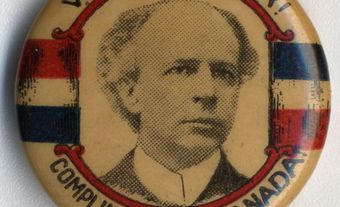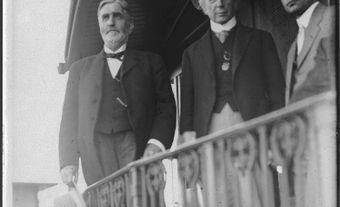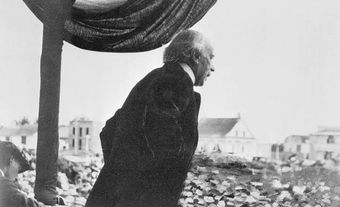
Bien que l’on se souvienne de lui pour ses idéaux libéraux, Wilfrid Laurier aura également été un homme politique doté de grandes capacités de manipulation. En campagne, il exploite ses talents d’orateur pour éreinter ses adversaires et pour, sans vergogne, faire vibrer la corde sensible chez les électeurs canadiens. Il se livre à ce double exercice dans un discours prononcé lors de la campagne électorale de 1904, le 14 octobre à Toronto au Massey Hall. Il défend tout d’abord son bilan lors de huit années au pouvoir en opposant les erreurs « ponctuelles et insignifiantes » des gouvernements qu’il a dirigés et les « montagnes d’iniquité » érigées par les conservateurs en 24 ans de pouvoir. Ensuite, il embouche la trompette du patriotisme, livrant une nouvelle version de son discours favori, repris, cette même année, sous différentes formes lors de plusieurs allocutions, sur le fait que le XXe siècle sera celui du Canada.
(Voir aussi La voie ensoleillée: les discours de sir Wilfrid Laurier.)
Canada’s Century: Massey Hall, Toronto, Ontario, 14 October 1904
Yet once more it is my privilege to appear before an audience of my fellow citizens of this the banner city of the banner province of the Dominion. (Applause) It is always a pleasure for me to come to the City of Toronto, for in the past years, more than once, I have experienced your kindness towards me and every time in past years it has been my privilege to come before you, you have tendered me such a reception as … can be excelled nowhere except in Toronto itself. In this city, however, it is possible for you to excel yourselves.
“The 19th century has been the century of United States’ development… Let me tell you, my fellow countrymen, that all the signs point this way, that the 20th century shall be the century of Canada and of Canadian development. For the next 70 years, nay for the next 100 years, Canada shall be the star towards which all men who love progress and freedom shall come."
I do not claim credit for the prosperity which this country has witnessed, that as a result of the policy followed by this Government the name of Canada has gained a prominence it had not eight years ago. (Applause) I assert that the name of Canada during these eight years has travelled far and wide, and whether a man must be a friend or foe he knows that he must admit that there are today in Europe thousands and thousands of men who had never heard the name of Canada eight years ago and who today, every day, turn their eyes towards this new star which has appeared in the western sky. (Applause)
We are just at the beginning of the twentieth century. It is the year 1904. We are a nation of six million people already; we expect soon to be twenty-five, yes forty millions. There are men living in this audience, men over there (points to the young people in the gallery), the hope of the country (applause) who before they die, if they live to old age, will see this country with at least sixty millions of people. (Renewed applause)
Under such circumstances are we not to provide for the future, or shall we be content to grow up in the gutter and not take steps towards our higher destiny? It is often the mistake of nations that they do not apprehend fully the necessities of the situation. They fail in boldness. That is not and never shall be the case with the Government which I represent before you today. (Applause) We shall not, whatever our errors are otherwise, we shall not err for want of boldness. (Renewed applause)
I tell you nothing but what you know when I tell you that the nineteenth century has been the century of American development. The past one hundred years has been filled with the pages of her history. Let me tell you, my fellow countrymen, that all the signs point this way, that the twentieth century shall be the century of Canada and Canadian development. (Cheers) For the next seventy years, nay for the next one hundred years, Canada shall be the star towards which all men who love progress and freedom shall come.
Men of Toronto, I have no right to speak to you; I am simply a Canadian like yourselves, coming from another province, but trying my best to unite our common people. (Applause) Men of Toronto I ask you – and this is the prayer I want to convey to you – I simply ask you to forever sink the petty differences which have divided you in the past and unite with us and take your share of the grand future which lies before us. (Cheers) I give that prayer to you.
But if there is one class to which above all others I would convey the appeal it is not you older men, you middle-aged men, but to the young boys in the gallery, the hope of the country. (Cheers) To those, sir, who have life before them, let my prayer be this: Remember from this day forth never to look simply at the horizon, as it may be limited by the limits of the province, but look abroad all over the continent, wherever the British flag floats, and let your motto be Canada first, Canada last, Canada always. (Applause lasting several minutes)

 Partager sur Facebook
Partager sur Facebook Partager sur X
Partager sur X Partager par Email
Partager par Email Partager sur Google Classroom
Partager sur Google Classroom


